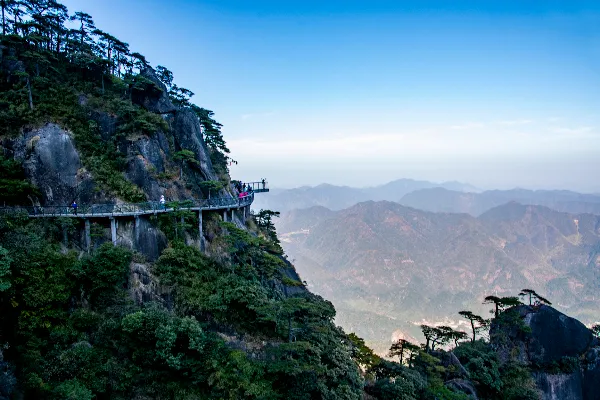
Mount Mingyue Scenic Area is located in Yuanzhou District, Yichun City, Jiangxi Province. It is a national 5A-level tourist attraction and a national scenic spot. The total area of the scenic spot is 136 square kilometers, with a core touring area of 37.5 square kilometers. The main peak, Taiping Mountain, stands at an elevation of 1,735.6 meters. Mount Mingyue is renowned for its "peculiar peaks and perilous canyons, hot springs and waterfalls, rare flora and fauna, and Zen Buddhist culture." Comprising twelve peaks over 1,000 meters including Taiping Mountain, Yujing Mountain, Laoshan Mountain, and Yangshan Mountain, it is celebrated as a "natural oxygen bar" and the "foremost mountain in Jiangnan."
History and Culture
Mount Mingyue boasts a long history and profound cultural heritage. As early as the Eastern Han Dynasty, Taoist priests practiced self-cultivation here. During the Tang Dynasty, it became an important Buddhist Zen site where Master Huiji, founder of the Weiyang Zen sect, preached. The Song Dynasty saw the peak of Mount Mingyue's Buddhist culture, with numerous temples and thriving incense offerings. In the Ming and Qing Dynasties, it became a favored destination for literati, leaving behind many poems, verses, and cliff inscriptions.
Mount Mingyue is also a sacred site of revolutionary history. In the 1930s, Peng Dehuai led the Red Fifth Army in guerrilla warfare here, establishing the Hunan-Jiangxi Border Revolutionary Base. Revolutionary relics such as the Red Army Cave and Red Army Hospital remain to this day, bearing witness to those extraordinary years.
The hot spring culture of Mount Mingyue dates back centuries. The Southern Song Dynasty saw the development and utilization of these springs. Ming Dynasty geographer Xu Xiake visited and documented them in his travelogue. Today, hot spring therapy has become a signature feature of Mount Mingyue tourism.
Main Attractions
Qingyun Plank Walk
The iconic Qingyun Plank Walk stretches 3,100 meters along cliffs at over 1,500 meters elevation, with its narrowest section just one meter wide. Winding like a dragon around the mountain, it offers breathtaking views of valleys and peaks, with mist creating an ethereal atmosphere. The midway Moon Lake is a pristine alpine lake whose crystal-clear waters mirror the surrounding mountains.
Yungu Waterfalls
This five-tiered waterfall system has a total drop of 120 meters, with the highest single drop at 70 meters. The thunderous cascade is surrounded by lush vegetation and exceptionally high negative oxygen ion concentrations, making it a true "natural oxygen bar." In summer, the mist creates refreshing coolness, while winter transforms the falls into spectacular ice formations.
Moon Lake
At 1,580 meters elevation, this 200-acre alpine lake is a rare Jiangnan high-altitude water feature. Its crescent-shaped island gives the lake its name. Morning mists and sunset reflections create magical scenery, with viewing platforms and trails offering perfect vantage points.
Hot Spring Resort
The resort area features numerous hot springs maintaining temperatures of 68-72°C year-round, rich in selenium, metasilicic acid and other beneficial minerals. Combining natural landscapes with therapeutic soaking, the resort's hotels and open-air pools offer perfect post-hike relaxation.
Yangshan Temple
Founded in Tang Dynasty as a cradle of Weiyang Zen Buddhism, the temple's current Qing-era architecture houses precious stone inscriptions and Buddha statues. The annual temple fair on the 19th day of the second lunar month draws many pilgrims. Ancient trees and serene surroundings make it ideal for meditation.
Cuisine
Mount Mingyue Cured Meat
Made from local free-range pork using traditional curing methods, this flavorful meat is lean yet tender, served steamed, stir-fried or stewed in local farmhouse restaurants.
Hot Spring Tofu
Prepared with mineral-rich spring water, this exceptionally smooth tofu can be served cold, braised or in soups, offering both delicate texture and nutritional benefits.
Bamboo Tube Rice
A local specialty where glutinous rice, cured meat and mushrooms are baked in fresh bamboo tubes, absorbing the plant's fragrance for unique flavor.
Local Delicacies
Yichun city offers other specialties like stir-fried rice noodles, stuffed buns, and fermented tofu worth trying after mountain excursions.
Tickets
Entrance fee: ¥95/person (covers main attractions). Cable car fares extra: ¥80 uphill, ¥70 downhill. Hot spring tickets from ¥168. Discounts available for students/seniors with ID. Opening hours: 8:00-17:00 (peak season), 8:30-16:30 (off-season).
Suggested Itinerary
One-day route: Morning cable car to summit for Qingyun Plank Walk and Moon Lake; lunch at mountaintop restaurant; afternoon descent to see Yungu Waterfalls; evening hot spring soak. Two days allow deeper cultural exploration including Yangshan Temple.
Transportation
- By air: Nearest airport is Yichun Mingyueshan Airport (15km from scenic area)
- By high-speed rail: Take train to Yichun Station, then transfer to tourist shuttle (40 minutes)
- By car: 2.5-hour drive from Nanchang via G60 Hukun Expressway and G45 Daguang Expressway
- Within scenic area: Cable cars and shuttle buses connect major attractions
Must-See Attractions
- Qingyun Plank Walk: Thrilling cliffside pathway
- Yungu Waterfalls: 120-meter waterfall system
- Moon Lake: High-altitude alpine lake
- Hot Spring Resort: Mineral-rich therapeutic baths
- Yangshan Temple: Birthplace of Weiyang Zen Buddhism
Travel Tips
- Best visiting months: April-October (May for peak rhododendron blooms)
- Allocate 1-2 days for proper exploration
- Bring warm layers for cooler mountain temperatures
- Wear sturdy, non-slip hiking shoes
- Pack swimwear for hot spring experience
- Combination tickets offer cost savings
Precautions
- Observe all safety regulations and avoid restricted areas
- Exercise caution on cliffside paths (not recommended for acrophobes)
- Protect environment - no littering
- Limit hot spring soaking time
- Secure personal belongings
- Watch footing during rainy weather